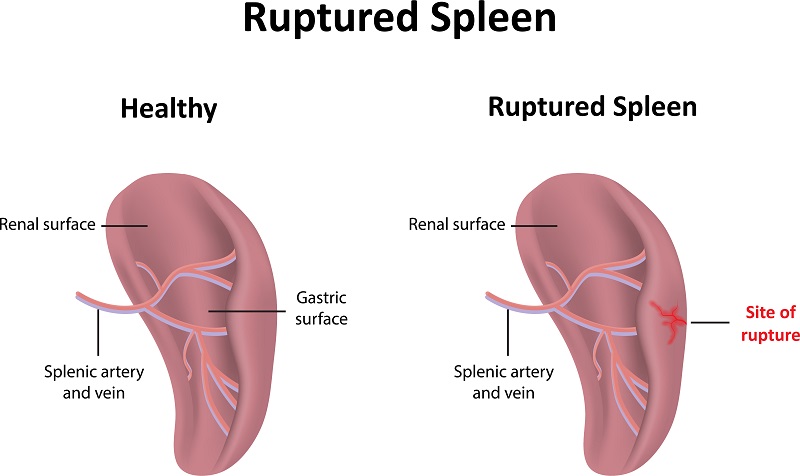
A ruptured spleen is a serious condition that requires immediate medical attention. Unless treated, a ruptured spleen can lead to serious complications from internal bleeding, including death. The good news is that spleens don’t just rupture out of nowhere, so you’ll likely be pretty aware that you’re dealing with an issue that requires medical intervention. Below, we take a closer look at what can cause a spleen to rupture, and how surgeons treat a ruptured spleen.
Causes of a Ruptured Spleen
Your spleen is located just under your rib cage on your left side, and it helps your body fight infection and filter old blood cells out of the bloodstream. In the vast majority of cases, a ruptured spleen derives from one of two main causes:
- Trauma – Forceful trauma to the abdomen can result in a tear or rupture of the spleen. They can occur during things like a car accident, a fist fight, a collision during athletics or a fall from a great height.
- Enlarged spleen – Disease or infection can cause the spleen to enlarge. If it can’t function properly, the spleen can enlarge until it actually ruptures on its own, but an enlarged spleen carries its own symptoms, so again there will likely be plenty of warning signs of an issue ahead of a rupture.
Symptoms of an enlarged or ruptured spleen include:
- Pain in the upper left abdomen
- Tenderness when touching the area
- Left shoulder pain
- Confusion
- Dizziness
- Lightheadedness
If you are experiencing any of these symptoms, especially if you’ve experienced trauma to the left side of your abdomen, seek medical attention.
Treating a Ruptured Spleen
If you believe you’re dealing with a ruptured or enlarged spleen, your doctor can confirm the diagnosis with a few basic tests. They’ll conduct a physical exam to look for tenderness in the area, and then they’ll use blood or imaging tests to look for other related issues. Blood tests can reveal platelet disparities that suggest an issue with your spleen, while an ultrasound can look for signs of bleeding.
Treatment varies based on the severity of the rupture. Small tears do have the ability to heal on their own, although you’ll likely be kept in a medical facility so medical staff can ensure healing is going as expected and that you’re not in danger. Other small tears may be able to be surgically addressed by a surgeon using stitches.
Spleen Surgery
More commonly in cases where the spleen has ruptured, a partial or total splenectomy is performed. In this surgery, the surgeon will remove a portion or all of the injured spleen. If a partial splenectomy can be performed, it is optimal because the remaining portion can help your body fight against infections. Individuals who undergo a total splenectomy may need to take certain medications for the remainder of their life to help boost their immune system and help their body fight off foreign invaders. You can live just fine without a spleen so long as you take a couple precautions and know you’re at an increased risk of infection.